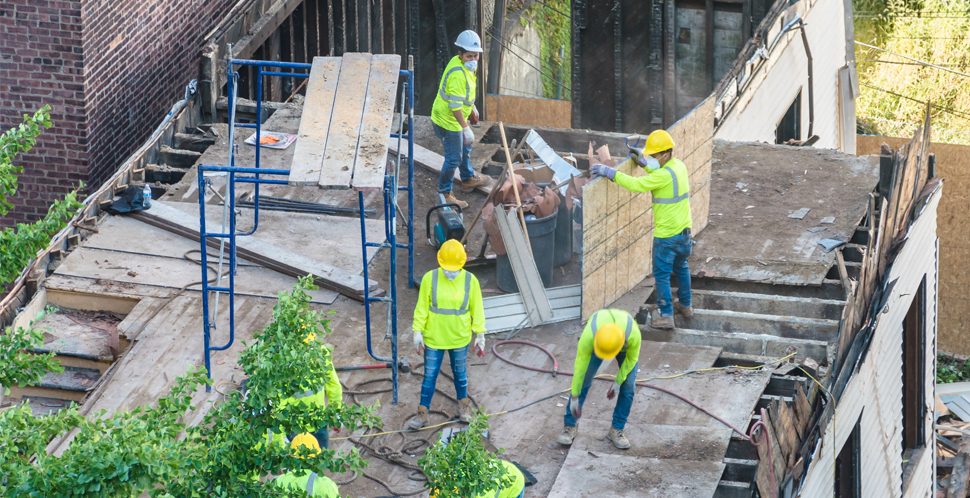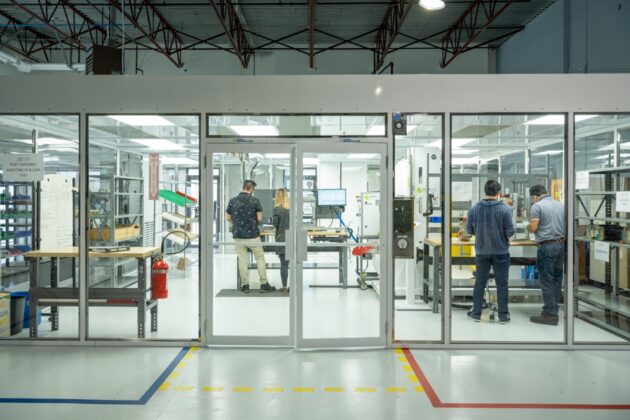Salvaging materials while deconstructing homes is a growing business practice in Vancouver, and this high-potential industry is a vital part of our journey towards a circular economy.
On February 17, the Real Estate Board of Greater Vancouver (REGBV) hosted an event to explain the circular economy, and its importance, to real estate practitioners from across Metro Vancouver. Moderated by the Vancouver Economic Commission (VEC), the panel highlighted both the regulatory shifts towards deconstruction in Metro Vancouver as well as the potential value of the salvageable materials they might be discarding.
Real estate is a massive industry in Vancouver where every dollar counts. Buildings are also the largest source of greenhouse gases, both from burning natural gas and in the material waste the built environment produces in construction and demolition.
Panellists in real estate, deconstruction and salvage, and municipal solid waste management all spoke to how embracing circular economy approaches to buildings can ensure that every recovered 2×4 matters and every penny counts.
As VEC, BCIT and national deconstruction leaders Unbuilders uncovered in groundbreaking research last year, salvaging materials has the potential to be a huge economic boost. In the 2020 report, researchers Kinsey Elliot, Erica Locatelli, and Carl Xu found that at current valuations, the estimated volume of salvageable wood in Metro Vancouver across the 780+ residential demolitions suitable for unbuilding is worth approximately $340 million a year.
The City of Vancouver is working to address the thousands of tonnes of construction and demolition waste to landfill every year with regulations like the City’s deconstruction bylaw. This bylaw requires all pre-1910 and heritage registered buildings to be deconstructed, or “systematically dismantled, typically in the opposite order to which it was constructed,” but there is much more work to be done to build a fully circular economy in the built environment.
This is where the work of Habitat for Humanity is so important: their proposed Rebuild Hub, vocally supported by both VEC and the City of Vancouver, is working to create a sales network, educational resources, and training programs for this new “deconstruction economy.”
Armed with this knowledge, the panellists and VEC hope that realtors and other real estate professionals will become part of the chorus of champions to drive Vancouver towards the circular economy.
During the session, speakers referenced numerous initiatives, case studies and theories from around the world for delivering circularity in the built environment.
For more information, refer to the key resources listed below.
Regulating Deconstruction in Vancouver
Faisal Mirza, P.Eng, PE, PMP, MBA, Senior Project Manager, Solid Waste Strategic Services
-
Zero Waste Vancouver 2040 – Zero Waste 2040 is a long-term strategic vision for Vancouver to achieve the goal of zero waste by 2040.
-
Vancouver’s Climate Emergency Action Plan Big Move on “How we Build and Move” – The City of Vancouver’s plan to reduce the carbon emissions associated with building materials (“embodied carbon”) in new construction, which will mandate the use of more salvaged and reused materials.
- Metro Vancouver’s Construction and Demolition’s Toolkit – A guide for the building and construction industry on how to comply with regulations and sustainably build and demolish.
The Practice and Value of Deconstruction
Adam Corneil, CEO, Unbuilders
-
The Business Case for Deconstruction – A market-valuation study developed by Unbuilders and VEC in partnership with BCIT researchers, which identifies a potential market of $340 million annually for salvaged wood.
-
Unbuilders – Unbuilders is the premier commercial deconstruction company in Canada. It is a team of salvage experts staffed by former carpenters, roofers, framers, and tradespeople who have made the switch from construction to deconstruction.
-
Unbuilders on Dragons Den – Unbuilders CEO Adam Corneil during his successful pitch on Dragons Den.
-
Business in Vancouver Feature on Unbuilders – BIV profiles Adam Corneil and Unbuilders innovative approach to deconstruction.
Building a Circular and Salvaged Materials Marketplace
Suzanne Fruson, Vice President of Operations, Habitat for Humanity for Greater Vancouver
-
The Rebuild Hub — The Rebuild Hub is an initiative and physical storefront focused on the deconstruction and sale of salvaged materials. It is hosted by Habitat for Humanity and supported by the City of Vancouver and Vancity.
-
Habitat for Humanity’s Circular Economy Leadership – Habitat for Humanity has been working towards a circular economy of buildings for years.
-
Unbuilders and Habitat for Humanity Partnership Unbuilders and Habitat for Humanity are profiled by The Tyee for their work in the circular economy.
For more information about green building design and construction, refer to VEC’s green buildings page.



